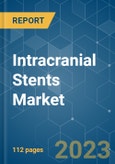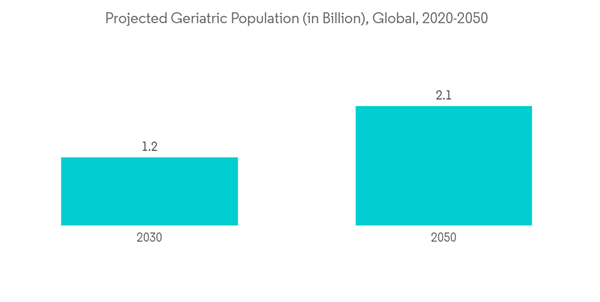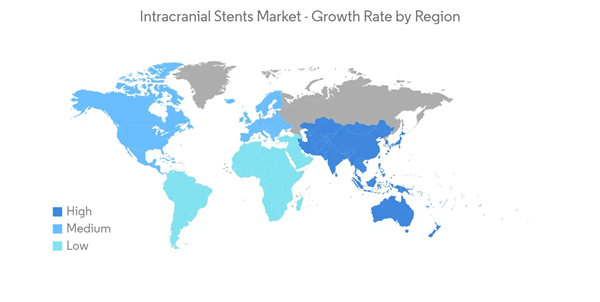The COVID-19 pandemic has impacted the growth of the intracranial stents market. The delays in performing elective procedures due to COVID-19-related measures had adversely affected the intracranial stents market, especially in 2020, as most of the procedures were canceled or postponed due to the diversion of resources toward the COVID-19 patients. There was a significant decrease in surgical procedures worldwide. For instance, according to the report of the British Journal of Surgery, in May 2020, around 48,728 surgical procedures per week were canceled in India which is estimated around 585,000 surgical procedures for 12 weeks. However, with the released COVID-19 restrictions, resumed surgical procedures and increased hospital visits and admissions due to accidents, the studied market is expected to recover from the decline of COVID-19 in the next two-three years.
Factors such as the rising prevalence of stroke, increasing demand for minimally invasive intracranial surgeries, and the growing geriatric population are boosting the market growth. For instance, as per the World Stroke Organization report of 2022, more than 12.2 million new stroke cases are reported each year, globally. In addition, as per the same source, the prevalence of stroke is highest among people aged 70 years and above (67%), followed by people aged between 15-49 years (22%). Thus, the high burden of stroke coupled with the increasing geriatric population is expected to increase the demand for stent-retriever thrombectomy treatment for removing blood clots forming the brain. This is anticipated to fuel the market growth over the forecast period.
Additionally, as per an article published in the Egyptian Journal of Neurology, Psychiatry, and Neurosurgery, in October 2022, intracranial atherosclerotic stenosis (ICAS) is one of the main causes of stroke worldwide and its prevalence varies depending on the demographic, with Asians, Hispanics, and African Americans. In addition, as per the same source, ICAS affects 10% of the estimated 900,000 strokes or transient ischemic episodes (TIAs) yearly, and the probability of recurrence in these patients is 15% annually. Also, the Asian populations have a greater rate of strokes (33-50%) that can be attributed to ICAS as compared to the United States and western nations (10-15%). Thus, the high burden of ICAS among the population is expected to increase their risk of experiencing a stroke. This in turn is anticipated to fuel the demand for intracranial stenting procedures, hence propelling the market growth.
Furthermore, the rising company and university activities in developing technologically advanced stents are also contributing to the market growth. For instance, in January 2022, MicroPort NeuroTech Limited enrolled the first patient in the PROMISE Study, a pre-market clinical study for the Rebridge Intracranial Visualized Stent evaluating the treatment of an intracranial aneurysm. Therefore, owing to the aforementioned factors the studied market is expected to grow over the forecast period. However, the lack of skilled professionals for operating using intracranial stents and cerebrovascular complications related to intracranial stenting are likely to impede the growth of the intracranial stent market over the forecast period.
Intracranial Stents Market Trends
Brain Aneurysm Segment Expects to Register a Highest CAGR Over the Forecast Period
The brain aneurysm segment is expected to witness significant growth in the intracranial stenting market over the forecast period. The factors attributing to the segment growth are the rising incidence of brain aneurysms and the increasing geriatric population who are at greater risk of having this disease.The increasing geriatric population is more prone to develop brain aneurysms which are anticipated to fuel the market growth. For instance, as per an article published in the Annals of Medicine, in October 2021, it has been observed that the incidence of unruptured cerebral aneurysms is highest in patients over 60 years. Also, from an article published in NLM, in September 2021, it has been observed that unruptured aneurysms were more common in elderly women with a peak prevalence of 14.5% in Japanese women aged between 60-69 years. Also, according to the data published by WHO, in October 2022, about 1 billion people living globally were aged 65 years or above, in 2021. In addition, this number is projected to increase to 1.4 billion by 2030. Thus, the high burden of brain aneurysms among the population along with the growing elderly population is expected to raise the need for brain surgeries to remove blood clots. This is anticipated to propel the market growth.
Moreover, growing research and development activities in the field of brain and neurological disorders and the increasing number of therapeutic procedures associated with the brain as well as rising product launches and approvals are also expected to implicitly accelerate the growth of the market during the forecast period. For instance, in February 2022, MicroPort NeuroTech Limited received marketing approval from China’s National Medical Products Administration (NMPA) for its self-developed Neurohawk Stent Thrombectomy Device. The device is a self-expandable clot stent retriever used in endovascular invasive thrombectomy procedures to remove large clots in blood vessels. Thus, owing to the aforementioned factors such as the rising burden of brain aneurysms and associated risk factors as well as increasing product approvals, the studied segment is expected to grow significantly during the forecast period.
North America is Expected to Dominate the Intracranial Stents Market Over the Forecast Period
North America is expected to dominate the intracranial stent market over the forecast period owing to the factors such as the rising incidences of intracranial stenosis and brain aneurysms among the population, and the presence of a well-structured healthcare system. Also, the increasing demand for minimally invasive procedures as well as growing technologically advanced intracranial stents is expected to increase the market growth in the region.The growing prevalence of neurological disorders, idiopathic intracranial hypertension, and brain aneurysm is the key factor driving the market growth. For instance, according to 2022 data published by the Brain Aneurysm Foundation, about 6.5 million people in the United States have an unruptured brain aneurysm, annually. The annual rate of rupture is approximately about 8 - 10 per 100,000 people. According to the same source, about 30,000 people in the United States suffer a brain aneurysm rupture each year. Thus, the high number of people suffering from brain aneurysms is expected to increase the demand for intracranial stents hence boosting the market growth.
Additionally, as per the article published in May 2022, intracranial large artery stenosis (ILAS) is an important contributor to ischemic stroke in the United States. Thus, the burden of diseases related to stroke is increasing in the country and this is expected to drive the demand for intracranial stents used for stroke-related surgeries in the country.
Furthermore, the rising company focus on adopting various business strategies such as financing, collaborations, and others are also expected to increase the market growth. For instance, in August 2021, Fluid Biotech raised USD 4.7 million in the seed funding round. This fund is used to engage contract manufacturers to initiate production, complete regulatory milestones, and plan for the first-in-human implantation of its innovative stent, a hybrid polymer-metal flow-diverting brain stent, for treating brain aneurysms. Thus, owing to the aforementioned factors, the studied market is expected to grow significantly during the forecast period.
Intracranial Stents Market Competitor Analysis
The market is fairly competitive with the presence of global key players manufacturing the majority of intracranial stents. Market leaders with more funds for research and better distribution system have established their position in the market. Moreover, Asia-pacific is witnessing an emergence of some small players due to the rise of awareness. This has also helped the market grow. Some of the key companies in the market are Penumbra, Inc., Medtronic Plc, Stryker Corporation, Boston Scientific Corporation, Johnson & Johnson Services, Inc., Terumo Corporation, Cook Group, MicroPort Scientific and Acandis GmbH among others.Additional benefits of purchasing the report:
- The market estimate (ME) sheet in Excel format
- 3 months of analyst support
This product will be delivered within 2 business days.
Table of Contents
Companies Mentioned (Partial List)
A selection of companies mentioned in this report includes, but is not limited to:
- Penumbra, Inc.
- Medtronic Plc
- Stryker Corporation
- Boston Scientific Corporation
- Johnson & Johnson Services, Inc.
- Terumo Corporation
- Cook Group
- MicroPort Scientific
- Acandis GmbH
- Balt Extrusion
- MicroPort Scientific Corporation
- phenox GmbH










